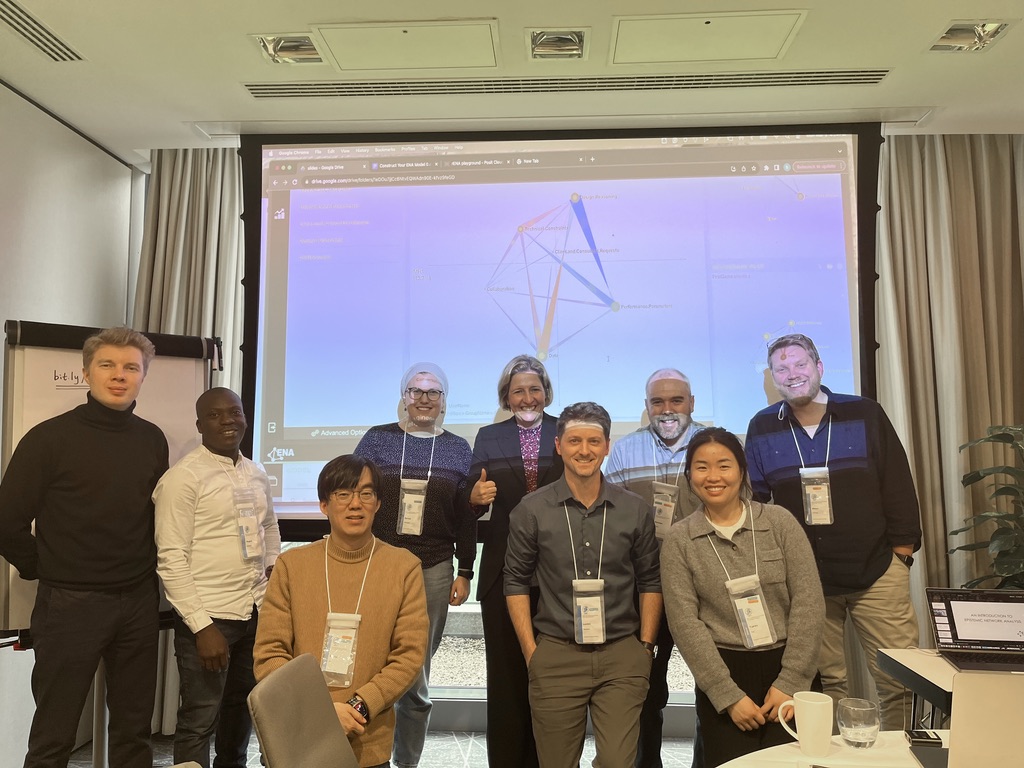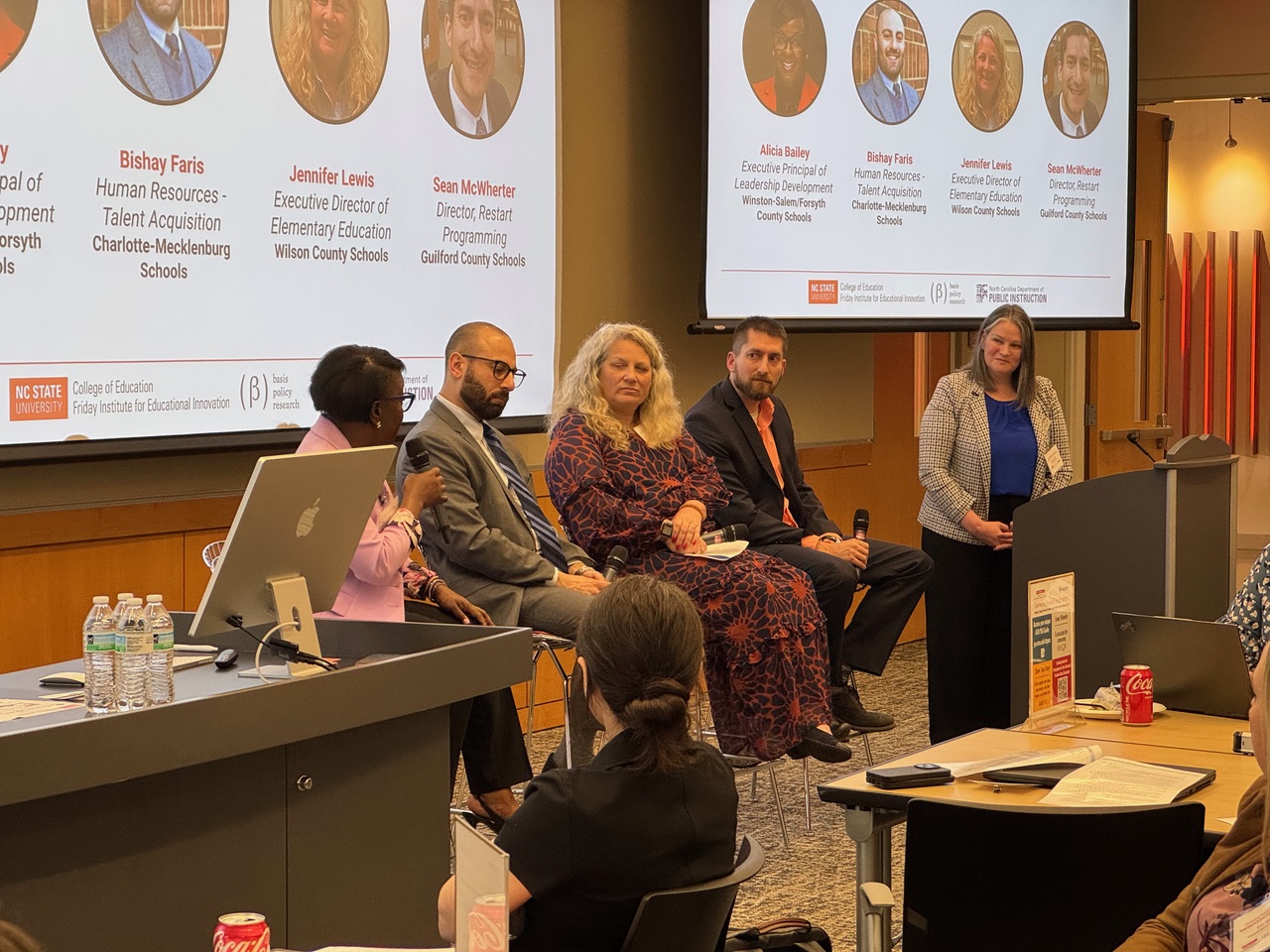2024-2025 Catalyst Grant Winners Announced
RALEIGH, N.C. — The Friday Institute for Educational Innovation and the NC State College of Education have awarded three Catalyst Grants that are designed to increase research collaborations between faculty and staff at both entities and seed collaborative, high-impact research that will lead to further inquiry and support.
“It is exciting to see how these collaborations among researchers at the Friday Institute and faculty in the College of Education academic departments are working together to study critical issues facing education today,” said Karen Hollebrands, associate dean for research and innovation in the College of Education. “They are investigating how to use computational thinking to empower young girls, examining how professional development on social-emotional learning can improve teacher retention and considering the ways instructors can use artificial intelligence as an instructional aid in online courses. These innovative projects have the potential to inform both research and practice in K-12 schools and beyond.”
The grant review team included Krista Glazewski, executive director of the Friday Institute and associate dean for translational research in the College of Education; Braska Williams, director of the NC-MSEN Pre-College Program at the Friday Institute; Jose Picart, deputy director of the Friday Institute; and Jenn Ayscue, associate professor of educational policy and educational leadership in the College of Education.
See below for a list of winning proposals and researchers.
Empowering Rural Young Girls: Enhancing Computational Thinking Through a STEAM Club
As technology increasingly becomes an essential tool, the participation of females from rural, high-poverty and diverse ethnic backgrounds in computer science (CS) and computational thinking (CT) is crucial. Research has shown that exposure to computing and computational thinking at an early age can foster interest and strengthen female empowerment in STEM (science, technology, engineering and mathematics) fields. This project team will create a STEAM club designed to introduce CT to third through fifth grade females from rural, high-poverty and diverse ethnic backgrounds in Montgomery County Schools in North Carolina through hands-on activities and near-peer mentorship from female CS students at NC State University.
The club will introduce CT concepts such as algorithmic thinking, conditional logic and loops through hands-on activities involving making, crafting and arts. At the end of the program, club members will showcase their projects at NC State through digital media presentations on campus. The program will incorporate professional development for teachers and club facilitators, equipping them with CS instructional training and other CS integration strategies, ensuring that the teachers have the necessary knowledge and skills to effectively support and enhance CT learning in the club.
Awarded to: Joey Huang, assistant professor of learning, design and technology in the College of Education; Carrie Robledo, computer science research scholar at the Friday Institute; and Rebekah Davis, research scholar at the Friday Institute
The Impact of SEL Professional Development & Wellness Skills on Teacher Retention
Resilience in educators has primarily been studied from the perspective of persevering in the profession rather than from the lens of health and well-being, although more studies are emerging with this emphasis since the COVID-19 pandemic. With the numerous complexities in the profession, North Carolina is faced with the challenge of retaining teachers. This project will address this loss of beginning teachers by providing research and support for teachers with professional development and tools to support social-emotional learning (SEL) in their classrooms as a strategy to promote a community of learners. This work is rooted in the premise that promoting the resilience of beginning teachers and creating improved classroom environments will have a positive effect on beginning teacher retention. The project team seeks to enhance beginning teachers’ understanding of the impacts of SEL on adults’ well-being and equip them with skills using the Community Resiliency ModelⓇ to better prepare them for the challenges of the profession. The purpose of this project is to determine the effectiveness of providing the College of Education’s elementary and middle school level pre-service teachers with strategies and skills for resilience and self-care, as well as an understanding of SEL and how to implement it in their classrooms. The outcome of this project will impact decisions to determine if it can be replicated in other undergraduate teacher preparation programs across the university, the state and potentially in school administrator preparation programs.
Awarded to: Krista Holland, professional learning scholar at the Friday Institute; Alicia Fischer, research scholar at the Friday Institute; and Gail Jones, Distinguished University Professor of Science Education in the College of Education and senior faculty fellow at the Friday Institute.
My Teaching Copilot: Prototyping an AI Assistant to Facilitate Cognitive Presence in Collaborative-Inquiry Online Learning
With the ever-increasing enrollment of online learners and the use of discussion boards across teaching formats and grade levels, there is an urgency to develop tools that decrease instructors’ workload and facilitate learners’ cognitive development. However, little work has thoroughly examined how to make the automated analysis of cognitive presence reach instructors and practitioners in real time during online learning. Without adequate support for instructors on how cognitive presence occurs in online learners’ discourse and theoretically sound strategies for discourse facilitation, the potential of quality online discussions gets undervalued or ignored. This project aims to remedy this gap by pioneering the application of large-language models through the OpenAI platform to create an assistant to support online instructors in discussion facilitation in real time.
The proposed project builds on Ela Castellanos-Reyes’ ongoing work of automated classification of online learners’ cognitive presence using GPT-3.5 models and the production of an AI-adapted cognitive presence codebook. This project team proposes the prototyping and development of an OpenAI-powered assistant pre-loaded with an AI-adapted cognitive presence codebook and instructional advice that will support online instructors’ understanding of cognitive presence in students’ text interactions and provide instructors with theoretically grounded instructional advice to guide online students in moving through the collaborative inquiry process.
Awarded to: Ela Castellanos-Reyes, assistant professor of learning, design and technology in the College of Education; and Cigdem Meral, research assistant at the Friday Institute
About the Friday Institute
The Friday Institute for Educational Innovation advances K-12 education through innovation in teaching, learning and leadership by bringing together students, teachers, researchers, policymakers and educational professionals to foster collaborations that improve education for all learners. The Friday Institute for Educational Innovation is part of NC State’s College of Education, one of the leading land-grant colleges of education in the nation.


